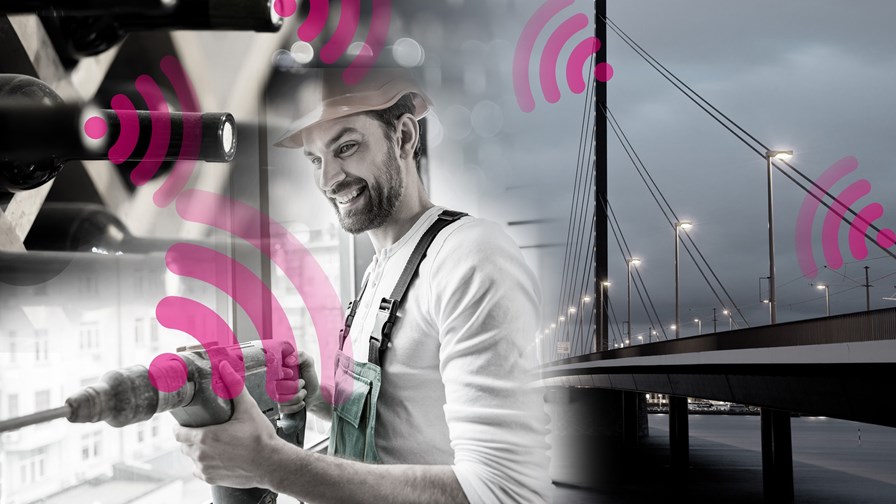Deutsche Telekom seeks to solidify its position in the middle of the IoT ecosystem

via Deutsche Telekom
- German incumbent launches IoT Solution Optimiser
- Businesses able to model performance of cellular-based IoT services
- Global IoT spending expected to reach $745 billion this year
In case it wasn't clear already that Deutsche Telekom wants to play a pivotal role in the IoT market, on Tuesday it launched an IoT Solution Optimiser, giving itself another channel through which to offer consultative IoT services.
The online tool enables businesses to model and optimise various IoT applications, from smart cities to security and asset tracking. The aim is to save customers time and money that would ordinarily be spent on pilots. It also means Deutsche Telekom can play the dual roles of consultant and solutions provider.
Offerings from a broad range of IoT ecosystem players have been included in the Solutions Optimiser, such as chip makers, module OEMs, device and battery makers, as well as service providers, consultancy and prototyping service providers, including Deutsche Telekom's own hub:raum tech incubator.
It is worth noting that this is specifically for services running on NB-IoT networks. Deutsche Telekom plans to add support for LTE-M by the middle of this year, so this is very much about modelling cellular, rather than non-cellular IoT solutions.
An online tool could be a shrewd move, as more and more industries seek to optimise processes by generating and analysing more and more data from connected devices.
According to recent statistics from IDC, discrete manufacturing, process manufacturing, transportation, and utilities will be the biggest IoT spenders in 2019, as overall spending tops $745 billion worldwide this year.
Full press release below:
- Optimize IoT solutions in just minutes to minimize cost and risk
- First global IoT ecosystem connecting customers with industry-leading hardware and service partners
- Available on mobile IoT technology NB-IoT now and LTE-M as of mid-2019
Deutsche Telekom today launches the IoT Solution Optimizer, a scalable online tool that provides technical consultancy and customer onboarding services for reliable and cost-effective IoT solutions. It enables businesses around the world to model and optimize the performance of IoT applications in numerous vertical industries such as smart city services, security or asset tracking. The service brings together the hardware, application and network feature elements necessary to assess IoT solution designs. Users can either model their own custom design, or try a standard IoT offering off the shelf. All in an easy to follow, step-by-step experience that takes only minutes.
“Businesses investing in IoT solutions increasingly look for leadership in a fast-developing, yet still very fragmented industry,” says Ingo Hofacker, Senior Vice President, responsible for the IoT business at Deutsche Telekom. “Deutsche Telekom’s IoT Solution Optimizer is the first service which pairs technical IoT consultancy with a comprehensive solutions shelf. It is extremely easy to use, offering reliable guidance and exceptional choice throughout the process. Our clients can now make fact-based decisions before rolling out their intended IoT solutions, significantly improving time-to-market, while minimizing cost and risk.”
Optimal IoT solutions in no time
Nowadays, enterprises who want to deploy IoT solutions on a large scale often perform costly pilots to gauge whether their designs deliver the long operating lives that their business case mandates. With the IoT Solution Optimizer, customers can assemble a “virtual twin” of the product they want to deploy, for example a smart parking service. They first pick the countries where their smart parking sensors will run, the access technology and the relevant hardware components, such as radio modules and batteries. Then, they specify the behavior and deployment aspects of the smart parking application, including payload and protocol, power saving features, coverage and temperature environments. Once the custom design is finalized, it is used to model reliable results of expected battery life on the selected operator networks. The IoT Solution Optimizer also shows what aspects of the solution can be optimized to improve economic viability. Performance analyses that would have previously taken industry experts several man-weeks to complete, can now be delivered to customers in just seconds.
The world’s first IoT ecosystem
The IoT Solutions Optimizer brings together for the first time a strong network of globally recognized IoT players. These include:
- IoT Chipset Vendors: Sequans, Altair Semiconductor, HiSilicon, MediaTek, Samsung Electronics
- IoT Module OEMs: u-blox, Advantech, Fibocom, Foxconn, Gemalto, Lierda, Murata, Neoway, Quectel, Ruijie Networks, Sierra Wireless, SIMCom, Telit, Teltonika
- IoT Device Suppliers: CompoTEK, DIGI International, Tekmodul, LUPUS-Electronics, Nedap Mobility Solutions, Sercomm
- Battery Manufacturer: Saft, a company of TOTAL
- IoT Platform with oneM2M Service Layer: Chordant
- IoT Consultancy, Acceleration and Prototyping: hub:raum, Detecon, ORBIT IT-Solutions
- IoT Service Providers: Veolia
Deutsche Telekom is ready to integrate additional mobile network operators and suppliers into the service to further enrich the IoT experience for customers, bridge the industry’s fragmentation, and allow for modeling of device performance in numerous markets across the globe. Interested parties are welcome to join.
Availability
The IoT Solutions Optimizer is currently available for applications based on the mobile IoT technology NB-IoT (NarrowBand IoT). NB-IoT solutions can be analyzed and optimized for eight markets with Deutsche Telekom networks: Austria, Croatia, Czech Republic, Germany, The Netherlands, Poland, Slovakia, and the United States. Hungary will be included in the coming months. Modeling based on the mobile IoT technology LTE-M (LTE for Machines) will be introduced in Q3 2019.
As part of Deutsche Telekom’s mobile IoT market push, the company has to date rolled out NB-IoT across nine countries in its European footprint as well as the United States. LTE-M is due to be rolled out as of mid-2019 in several of Deutsche Telekom’s European markets. Deutsche Telekom’s new mobile IoT Guide is available here.
Email Newsletters
Sign up to receive TelecomTV's top news and videos, plus exclusive subscriber-only content direct to your inbox.




